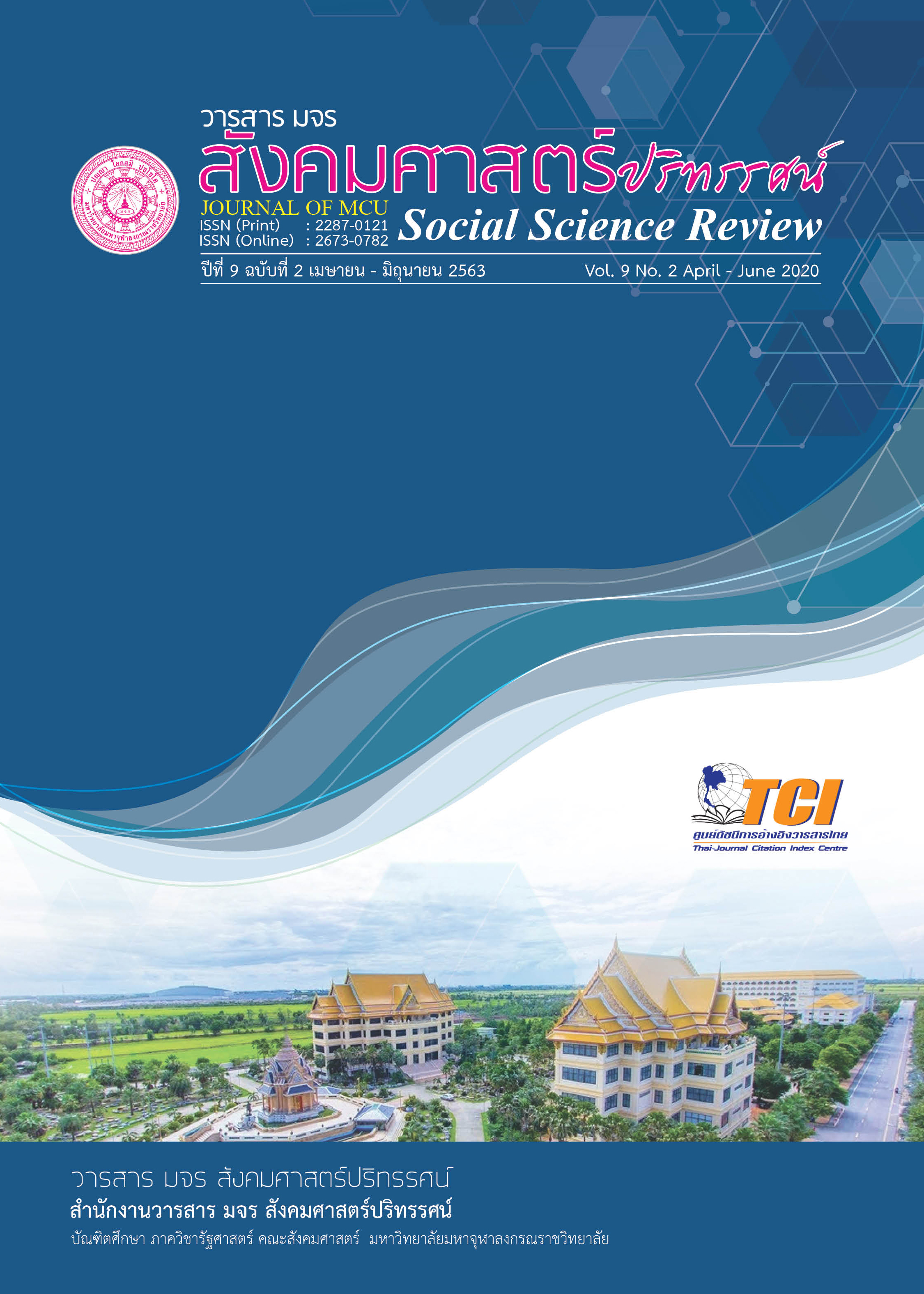สวัสดิการสังคมไทยในกระบวนการพัฒนา
คำสำคัญ:
สวัสดิการ, สังคมไทย, กระบวนการพัฒนาบทคัดย่อ
บทความนี้มุ่งเสนอที่มาและสถานะของการจัดสวัสดิการสังคมไทยในกระบวนการพัฒนาโดยใช้กรอบความคิดแบบวาทกรรมร พบว่า เดิมสวัสดิการสังคมไทยเกิดโดยธรรมชาติภายใต้ระบบเกื้อกูลกันของสังคมที่บุคคลภายในครอบครัวและชุมชนดูแลช่วยเหลือกันเองโดยไม่มีรูปแบบตายตัว เรียกว่า สวัสดิการโดยชุมชน หลังจากนั้นไทยได้รับอิทธิพลทางความคิดเรื่องการบริหารงานราชการและสิทธิมนุษยชนจึงทำให้รัฐมีบทบาทหลักในการจัดสวัสดิการให้กับประชาชน ชุมชนจึงถูกเปลี่ยนบทบาทมาเป็นผู้รองรับการพัฒนาจากรัฐ แต่หลังจากที่มีการกระจายอำนาจการปกครองสู่ท้องถิ่นชุมชนจึงได้กลับมามีบทบาทอีกครั้ง ทั้งนี้การจัดสวัสดิการโดยรัฐประกอบด้วย 3 รูปแบบ ได้แก่ การประกันสังคม การช่วยเหลือทางสังคม และการบริการสังคม ส่วนสถานะของสวัสดิการสังคมในกระบวนการพัฒนามีหลากหลาย ได้แก่ เครื่องมือในการพัฒนาคุณภาพชีวิตของประชาชน ตัวชี้วัดในการพัฒนา เงื่อนไขในการกีดกันทางการค้าระหว่างประเทศ และนโยบายประชานิยม ถ้าการจัดสวัสดิการสังคมนั้นมีวาระซ่อนเร้นย่อมส่งผลให้ประชาชนไม่ได้รับผลประโยชน์อย่างแท้จริง ดังนั้นในการจัดสวัสดิการในอนาคตจึงควรทบทวนแนวคิดการจัดสวัสดิการจากเดิมที่เคยเป็นหน้าที่ของรัฐฝ่ายเดียวมาเป็นการแสวงหาภาคีร่วมทั้งเอกชน ประชาสังคมในการจัดสวัสดิการ รวมทั้งรื้อฟื้นและส่งเสริมให้มีการจัดสวัสดิการโดยชุมชนเพื่อเสริมสร้างในระบบสวัสดิการไทยมีความเข้มแข็ง
เอกสารอ้างอิง
ฉัตรทิพย์ นาถสุภา. (2547). จากอาณานิคมสู่ทุนนิยม บันทึกการเยือนนิคารากัว และคอสตาริกา. กรุงเทพฯ: สร้างสรรค์.
ไชยรัตน์ เจริญสินโอฬาร.(2554). วาทกรรมการพัฒนา: อำนาจ ความรู้ ความจริง เอกลักษณ์และความเป็นอื่น (พิมพ์ครั้งที่ 5). กรุงเทพฯ: วิภาษา.
ณรงค์ เพ็ชรประเสริฐ และคณะ. (2546). บทสังเคราะห์ภาพรวมการพัฒนาระบบสวัสดิการสำหรับคนจนและคนด้อยโอกาสในสังคมไทย. กรุงเทพฯ: ศูนย์ศึกษาเศรษฐศาสตร์การเมืองจุฬาลงกรณ์มหาวิทยาลัย.
ปัทมาวดี โพชนุกุล ซูซูกิ. (2552). วรรณกรรมปริทรรศ์และการสังเคราะห์ความรู้ เรื่อง “สวัสดิการชุมชนในประเทศไทย”. กรุงเทพฯ: โครงการเสริมสร้างการเรียนรู้เพื่อชุมชนเป็นสุข.
ปรีดี พนมยงค์. (2552). เค้าโครงการเศรษฐกิจหลวงประดิษฐ์มนูธรรม (ปรีดี พนมยงค์) (พิมพ์ครั้งที่ 2). กรุงเทพฯ: สำนักพิมพ์สุขภาพใจ บริษัท ตถาตา พับลิเคชั่น จำกัด.
ระพีพรรณ คำหอม. (2554). สวัสดิการสังคมกับสังคมไทย (พิมพ์ครั้งที่ 3). กรุงเทพฯ: พริกหวานกราฟฟิค.
วันทนีย์ วาสิกะสินและคณะ. (2541). ความรู้ทั่วไปเกี่ยวกับสวัสดิการสังคมและสังคมสงเคราะห์. กรุงเทพฯ: สำนักพิมพ์มหาวิทยาลัยธรรมศาสตร์.
ศุภชัย ยาวะประภาษ และปิยากรณ์ หวังมหาพร. (2552). นโยบายสาธารณะไทย: กำเนิดพัฒนาการและสถานภาพของศาสตร์. กรุงเทพฯ: จุดทอง.
อภิญญา เวชยชัยและคณะ. (2547). สวัสดิการสังคม ฉบับชาวบ้าน: แนวคิด นโยบาย แนวทางปฏิบัติ. กรุงเทพฯ: ศูนย์ศึกษาเศรษฐศาสตร์การเมือง คณะเศรษฐศาสตร์ จุฬาลงกรณ์มหาวิทยาลัย.
Hugman R. (1998). Social Welfare and Social Value: The Role of The Caring Professions. Basingstoke, Hampshire: Macmillan Press.
Midgley et al. (2009). The Handbook of Social Policy. Los Angeles: SAGE.
Rosalie, A. et al. (2001). Social Work and Social Welfare: An Introduction. Australia: Brooks/Cole.
Trubek et al. (2003). Governing work and Welfare in a new Economy: European and American Experiments. Oxford: Oxford University Press.
Zastrow, C. (2008). Introduction to Social Work and Social Welfare: Empowering People. Australia: Thomson Brooks/Cole.
ดาวน์โหลด
เผยแพร่แล้ว
รูปแบบการอ้างอิง
ฉบับ
ประเภทบทความ
สัญญาอนุญาต
ลิขสิทธิ์ (c) 2020 วารสาร มจร สังคมศาสตร์ปริทรรศน์

อนุญาตภายใต้เงื่อนไข Creative Commons Attribution-NonCommercial-NoDerivatives 4.0 International License.
เพื่อให้เป็นไปตามกฎหมายลิขสิทธิ์ ผู้นิพนธ์ทุกท่านต้องลงลายมือชื่อในแบบฟอร์มใบมอบลิขสิทธิ์บทความให้แก่วารสารฯ พร้อมกับบทความต้นฉบับที่ได้แก้ไขครั้งสุดท้าย นอกจากนี้ ผู้นิพนธ์ทุกท่านต้องยืนยันว่าบทความต้นฉบับที่ส่งมาตีพิมพ์นั้น ได้ส่งมาตีพิมพ์เฉพาะในวารสาร มจร สังคมศาสตร์ปริทรรศน์ เพียงแห่งเดียวเท่านั้น หากมีการใช้ภาพหรือตารางหรือเนื้อหาอื่นๆ ของผู้นิพนธ์อื่นที่ปรากฏในสิ่งตีพิมพ์อื่นมาแล้ว ผู้นิพนธ์ต้องขออนุญาตเจ้าของลิขสิทธิ์ก่อน พร้อมทั้งแสดงหนังสือที่ได้รับการยินยอมต่อบรรณาธิการ ก่อนที่บทความจะได้รับการตีพิมพ์ หากไม่เป็นไปตามข้อกำหนดเบื้องต้น ทางวารสารจะถอดบทความของท่านออกโดยไม่มีข้อยกเว้นใดๆ ทั้งสิ้น





